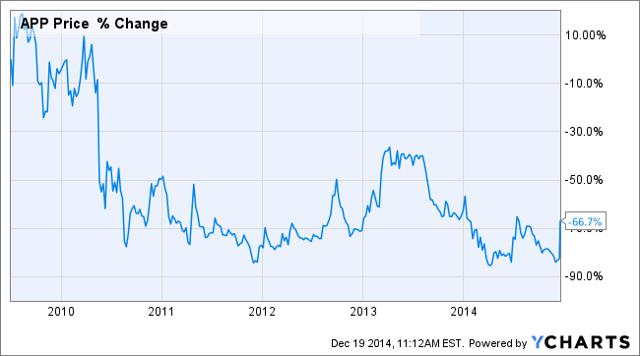This is the sort of shocking advertisements shown by American Apparel (APP).

APP faces controversy over running risqué ads such as this. Critics claim that such billboards are tasteless, sexist, and inappropriate. While APP is in the business of selling clothing, they show little enough of it in their ads. However, regardless of your reaction, it is clear that such ads have attracted plenty of attention - some positive and some negative. APP founder and former CEO Dov Charney discussed his ads in a recent interview.
Q: Do you ever look at one of your billboards and go 'whoa alright okay we went too far'?
A: Absolutely.
Q: And then what do you do?
A: We put up another one.
Bad
APP narrowly avoided bankruptcy after the government forced its management to fire about 1,800 employees or a quarter of their workers in 2009. They offer wages from $8-18 per hour (most are $10-12) as well as health benefits; these are jobs that their fired workers were infrequently able to find elsewhere. The company has struggled since then.
The government is deputizing private businesses to spy on their employees. Whether immigration laws should be tighter or looser, this has a troubling impact on civil society. Democratically elected representatives can pick levels of spending, taxing, and regulating, but they have to justify their decisions in front of the voters every two to six years. Those voters, in turn, can demand benefits to offset the costs of government. In recent years, the government has reached the limits of its resources and has transcended those resources by conscripting the private sector to serve the state. In doing so, it avoids having to justify the costs of their decisions. It gets around its own statutory mandates. It co-opts the private sector's balance sheet. It accomplishes all of this by forcing private businesses to do the government's dirty work.
Worse
In 2010, troubles continued for APP. Deloitte & Touche expressed concerns over internal controls regarding their financial disclosure. They quit as auditor. The U.S. attorney's office for the Southern District of New York and the SEC made inquiries. The company warned of a potential bankruptcy and the NYSE threatened them with delisting. APP reiterated the possibility of bankruptcy in 2013. Earlier this year, Crystal Financial loaned APP the $80 million that they needed to avoid bankruptcy. This replaced Bank of America (BAC) as one of APP's key creditors. However, the stock continued to decline for most of the year. In June 2014, APP suspended Dov Charney. He was fired earlier this week on December 16 but he still owns 43% of the company.
Hope? Change?
Following closely after the midterm elections of his second term, President Barack Obama focused attention on reforming our immigration system. He cannot run for president again and so is spending his remaining political capital with limited political consequences for himself. His efforts will have to survive court challenges and congressional opposition, but the president appears to be unconcerned with those impediments. If his reforms succeed, businesses such as APP could benefit.
What is next?
Mr. Charney and fellow APP investor Irving Place Capital are considering a bid for APP. This company should not be public. It will probably eventually go private or go bankrupt. Given the changes in this administration's approach to immigration, the private route might work and the equity might be worth something. The board should accept a deal around $1.60 per share. This price would leave the buyers plenty of room to benefit from a recovery beyond the short-term scrutiny of the public equity market. APP owns about $0.57 per share of NOLs which should be able to be utilized. Many of the problems at APP can be fixed. It has been a terrible half of a decade but the buyers understand what went wrong. The people responsible should be able to learn valuable lessons and move towards (tax-efficient) profitability in the years ahead. Once APP is away from the public market, the private owners can execute their business plan. That plan would include a renewed focus on e-commerce. Their wholesale business is another expansion opportunity. They will open new stores, expand their accessory business, and cut headcount. They can move production abroad to lower costs. Charney does not believe in borders. He is a committed free trader who would be happy to move production. With these opportunities, buyers paying $1.60 would be getting a discount to APP's expected value as a private company. If you want a discount on their clothes instead, their gift cards are currently available with a >25% discount.
